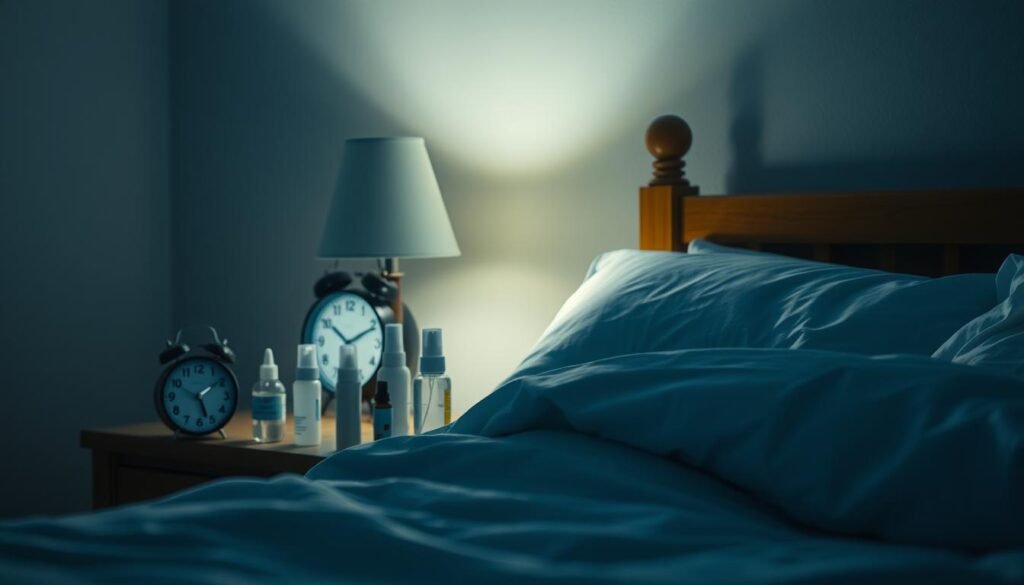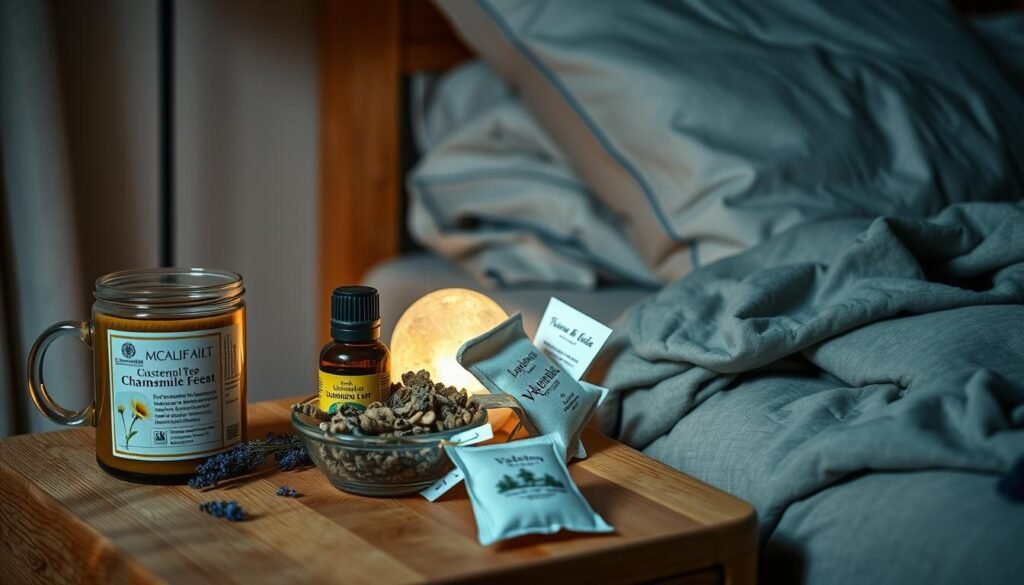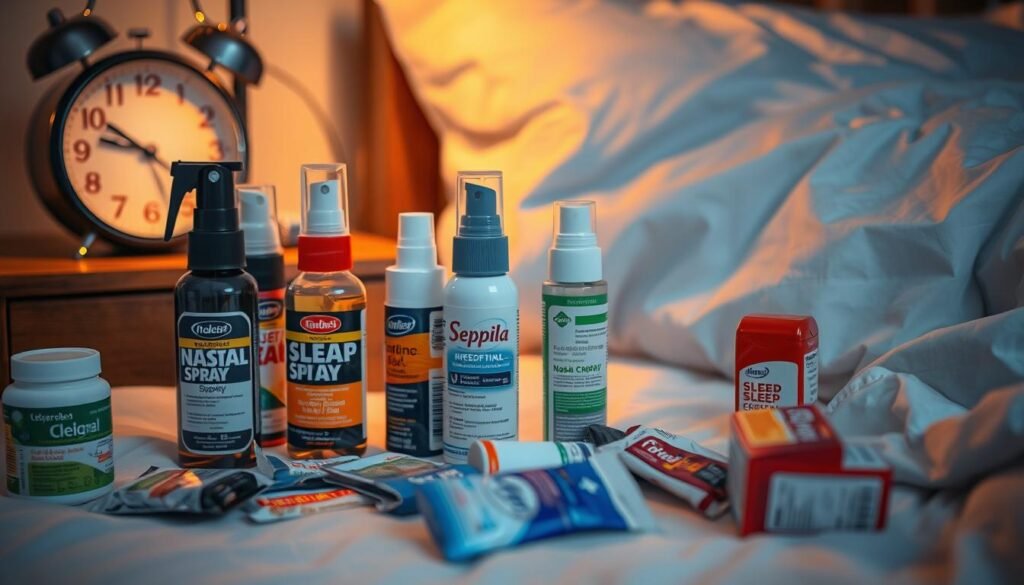Over 17% of American adults have faced sleep issues due to medications in 2016. This includes effects from nasal sprays. As more people look for nasal congestion remedies, knowing the side effects is essential. Many using steroid nasal sprays, like beclometasone and fluticasone, might not know they could disturb sleep.
These sprays help with hay fever and sinusitis but balancing relief and sleep is tricky. In this piece, we’ll discuss how nasal sprays might affect sleep. We’ll look into insomnia triggers linked to their use.
Key Takeaways
- Over 17% of American adults report sleep disturbances from medications.
- Steroid nasal sprays are used to treat conditions like hay fever and sinusitis.
- High doses or long-term use of nasal sprays can lead to insomnia.
- Users should consider potential interactions with other medications.
- Understanding individual responses to medication is crucial in managing sleep quality.
Introduction to Nasal Sprays and Their Usage
Nasal sprays are a top choice for quick relief from nose-related problems. They are used for allergic reactions, sinus issues, and even the common cold. By delivering medication right into the nasal passages, they quickly ease symptoms.
There are various kinds of nasal sprays available. Decongestants help with stuffy noses caused by colds or flu. However, they should be used for only three days to avoid making congestion worse. Corticosteroid sprays, on the other hand, are safe for long-term use. They treat ongoing conditions but may cause minor side effects like stinging or sneezing.
Antihistamine nasal sprays are another important type. Sprays with azelastine work well for allergies and are safer than pills. With allergies impacting millions in the U.S. each year, these sprays are key in daily treatment plans.
Nasal sprays are easy to get without a prescription, letting people treat themselves. But, it’s important to know about possible side effects. These can include mild irritation or trouble sleeping and may affect kids more.
Understanding Insomnia and Its Triggers
Insomnia is a common sleep issue. It means you may have trouble getting to sleep or staying asleep. About 30% of adults struggle with symptoms of insomnia. Meanwhile, chronic insomnia impacts around 15% of people. This condition can come from lifestyle choices or deep psychological problems.
Recently, experts have looked closely at what triggers insomnia. Medicines often disrupt sleep. This includes opioids, SSRIs, and corticosteroids. For example, decongestants such as pseudoephedrine can keep you awake. Surprisingly, even sedatives and antidepressants might make insomnia worse for some folks.
The U.S. Department of Health and Human Services sees insomnia as a top sleep complaint. Transient insomnia hits up to 80% of the population yearly, usually due to new stress or environment changes. Chronic insomnia might be linked to anxiety disorders. In fact, anxiety or panic disorders cause about 10% of chronic insomnia cases.
To improve sleep, it’s key to know what triggers your insomnia. This might include medication side effects. To learn more about treating and managing insomnia, check out this comprehensive resource.
Can Nasal Spray Cause Insomnia
Nasal sprays mainly tackle nasal congestion and sinus problems. They also play a big role in how well we sleep at night. By understanding these products better, we can see how they’re connected to sleep issues.
Overview of Nasal Sprays and Sleep
Some nasal sprays have decongestants like pseudoephedrine, and they might cause insomnia. These sprays can make it hard to sleep or stay asleep. Overusing them can get worse over time, impacting sleep quality even more.
Users might use the spray to ease congestion, but then they face bigger sleep problems.
Types of Nasal Sprays
Nasal sprays vary by what’s in them. The main types include:
- Decongestant sprays – They have ingredients like pseudoephedrine or phenylephrine but might mess up our sleep.
- Saline sprays – These are less harsh and help with congestion without affecting sleep.
- Corticosteroid sprays – They’re for long-term use and could also affect how we sleep.
Each nasal spray type influences sleep in its own way, raising concerns about their safety and link to insomnia.
Scientific Studies Linking Nasal Spray and Insomnia
A lot of studies show a connection between nasal sprays and insomnia. They find decongestants can cause sleep issues despite their relief. For example, more than 17% of Americans use medicines that can disturb sleep, including decongestants.
People keen on learning more about nasal sprays and sleep problems can check professional findings on this matter.
Also, some antidepressants and stimulants may significantly affect sleep. Knowing how these interact helps manage sleep better. For more insights, visiting guides on medication-induced insomnia can be helpful.
Nasal Decongestant Side Effects Explained
Nasal decongestants, especially those with pseudoephedrine, help with nasal congestion. However, they can have side effects. These side effects can affect sleep and overall health. Knowing about these effects helps users make better choices and lessen their impact.
Common Side Effects of Pseudoephedrine
Pseudoephedrine users might notice several side effects. These can even make sleep problems worse. Common ones include temporary burning or stinging, dryness in the nose, and sneezing.
Others are feeling nervous, dizzy, and headaches. There can also be trouble sleeping. Serious effects like changes in heartbeat or severe dizziness need doctor’s attention. Children are more sensitive to these effects, so it’s important to talk to a doctor before they use it.
Impact on Sleep Architecture
Using nasal decongestants like pseudoephedrine affects sleep. It can make it hard to enter deep sleep. This leads to feeling tired after waking.
Increased heart rate and anxiety from the medication make this worse. Trouble starting or keeping sleep also adds to the problem. Knowing these effects is important. It helps users decide better and find other options if needed.
| Symptom | Severity | Recommended Action |
|---|---|---|
| Burning/Stinging | Mild | Monitor, consult if persistent |
| Difficulty Sleeping | Moderate | Consider discontinuing use |
| Fast/Slow Heartbeat | Serious | Seek immediate medical attention |
| Severe Dizziness | Serious | Seek immediate medical attention |
Sleeplessness from Medication: A Broader Perspective
Medications can cause more than just a stuffy nose. Many can interrupt your sleep. Understanding the impact of different drugs on sleep is crucial.
Other Medications that Cause Insomnia
Some medications are known to disrupt sleep:
- Selective Serotonin Reuptake Inhibitors (SSRIs): These are given for depression and anxiety. They change serotonin levels and can disturb sleep.
- Beta-blockers: Used for heart issues, they can disrupt sleep by blocking adrenaline, leading to vivid dreams or nightmares.
- Corticosteroids: Given for inflammation and allergies, they can keep you awake, especially if taken later in the day.
Mechanisms of Medication-Induced Sleep Disruption
It helps to know why medications affect sleep. Here are some key reasons:
- Neurotransmitter Alteration: Many drugs change neurotransmitters important for sleep, resulting in sleep problems.
- Physiological Effects: Some medications can make you feel alert by increasing heart rate or blood pressure, making it hard to sleep.
- Behavioral Changes: Side effects from medications can cause stress or anxiety, making insomnia worse.
Over-the-Counter Drugs and Sleep
Nasal sprays are commonly used to clear up congestion. But, they can also affect how well you sleep. This is especially true for certain over-the-counter sprays. We will look at how these sprays work and their sedative effects. We’ll also discuss how they interact with other medicines.
Analysis of Over-the-Counter Nasal Sprays
Many people use nasal sprays like Afrin to quickly ease nasal congestion. Afrin has oxymetazoline that fights allergies and congestion from colds. Yet, if you use it too much, it can lead to rebound congestion. This makes sleep difficult.
Doxylamine is another OTC option in many cold medicines. It helps with symptoms and can also make you sleepy. However, it’s important to be careful using it, especially for kids under four. You shouldn’t use doxylamine for more than two weeks without seeing a doctor. Taking care of how you use these meds is key for good sleep.
Potential Interactions with Other Medications
It’s vital to know how OTC drugs and prescription meds might mix. For instance, mixing nasal sprays like Afrin with some antidepressants might cause side effects. These can include dizziness, faster heartbeat, and even hallucinations or seizures. That’s why talking to a healthcare provider is crucial if you’re taking different medications. Understanding these interactions can help you sleep better and stay safe.

| Nasal Spray | Common Uses | Reported Side Effects |
|---|---|---|
| Afrin (oxymetazoline) | Cold & allergy relief | Rebound congestion, lightheadedness, hallucinations |
| Doxylamine | Insomnia relief & cold symptoms | Drowsiness, dry mouth, potential overdose issues |
Knowing which medications can affect your sleep is crucial. For more details on this topic, you can read an analysis of medications that impact sleep.
Nasal Spray Ingredients and Their Effects
Nasal spray ingredients impact how well you sleep. Knowing the difference between things like corticosteroids and decongestants helps you choose wisely.
Corticosteroids vs. Decongestants
Corticosteroids reduce inflammation in the nose. They help with long-term issues. But, using them too much can cause sneezing and dry throat.
These side effects can make it hard to sleep. Decongestants, however, shrink blood vessels for quick congestion relief. But, they might keep you awake at night.
How Ingredients Impact Sleep Quality
Nasal sprays can affect sleep. Corticosteroids are good for the nose but might disturb sleep if used too much. Decongestants offer quick relief but can make relaxing tough.
Users need to think about both the good and bad. This includes possible severe allergic reactions that need doctor’s help right away.
Natural Sleep Aids: Alternatives to Nasal Sprays
When nasal sprays disrupt sleep, many seek other ways to sleep better. Natural remedies can improve sleep with fewer side effects than drugs.
Herbal Remedies for Sleep Troubles
Herbal solutions have become popular for those needing rest. People often choose:
- Chamomile tea, known for its calming properties, can help prepare the body for sleep.
- Valerian root, which may assist in reducing the time it takes to fall asleep.
- Lavender, used in aromatherapy, promotes relaxation and may enhance overall sleep quality.
- Passionflower, often recommended for its ability to alleviate sleep disturbances.
Herbal options are considered safe, effective alternatives to medicines. Always talk to a doctor before trying new herbal treatments, especially if you’re already on other meds.
When to Consider Natural Sleep Aids
If stress, the environment, or nasal congestion affect your sleep, natural aids might help. They’re good for those affected by nasal sprays at night. Think about natural remedies if:
- Experiencing difficulty falling or staying asleep.
- Struggling with sleep-related issues after using nasal sprays.
- Preference for holistic approaches to health.
- Desire to manage sleep issues without the risk of side effects from traditional medications.
Adding natural aids to your bedtime can enhance sleep. It’s a holistic strategy for better rest. Knowing what affects your sleep is key.

Managing Side Effects of Nasal Sprays
Nasal sprays can ease many symptoms, but it’s key to manage possible side effects, like insomnia. Knowing best practices helps reduce discomfort. It’s also crucial to talk with healthcare experts for safe use of nasal sprays.
Best Practices for Nasal Spray Use
To benefit from nasal sprays while limiting side effects:
- Follow the instructions to prevent overuse, which can cause rebound congestion.
- Don’t use decongestant sprays for more than three days to avoid long-term nasal problems.
- Spray with your head slightly forward for better absorption and fewer side effects.
- Try steroid sprays like fluticasone for lasting relief with fewer overall effects.
- Drink plenty of fluids to combat dryness from nasal sprays.
Consultation with Healthcare Professionals
Before starting nasal spray, talk with a doctor. This is crucial for those with sleep troubles or high blood pressure. A professional can offer guidance on safety. Important discussion topics include:
- Any current medicines and possible interactions.
- Existing health conditions that could worsen side effects.
- The right dose and how long to take it, based on your health.
- Possible side effects to watch for, including insomnia.
Knowing the benefits and side effects of nasal sprays leads to better health management. Always seek advice from healthcare experts. This is particularly important for pregnant or nursing folks.
Long-Term Use of Nasal Sprays and Sleep
Using nasal sprays for a long time can lead to some problems. These include issues with sleep and overall health. Many people use them safely but using them too much can cause side effects.
Risks Associated with Prolonged Use
Long-term use of nasal sprays can pose several risks. These include high blood pressure and headaches. You might also become dependent on them or have weaker bones from some types.
They can also make it hard to sleep. Some people, like kids, might react more to these problems. It’s important to think about your health, like if you have diabetes or high blood pressure.
Understanding Dosage and Frequency
It’s crucial to follow how much and how often you use nasal sprays. Most are okay for a short time, like 2-3 days. Using them more than that can cause problems, especially with sleep.
Talking to a doctor is important if you have health issues. Knowing how much nasal spray to use is key for good sleep and health.

Influence of Lifestyle Factors on Sleep Quality
Your sleep quality can greatly change based on different lifestyle habits. Knowing how your diet, exercise, and managing stress impact sleep can help you sleep better. This leads to improved overall health.
Diet, Exercise, and Sleep Connection
Eating right and staying active are key to better sleep. Foods rich in magnesium and tryptophan, like nuts and turkey, help you sleep well. On the other hand, too much sugar and processed foods can mess up your sleep.
Regular exercise makes a big difference in how well you sleep. It helps set your sleep schedule, making it easier to fall asleep and sleep deeply. Keeping up with regular workouts is crucial, especially for those who find it hard to sleep.
The Role of Stress Management
Managing your stress is vital for good sleep. Being too stressed out can make it hard to fall asleep and stay asleep. Using relaxation methods like meditation, yoga, or deep-breathing can help lower stress and lead to better sleep.
Having a relaxing bedtime routine helps improve your sleep. Take time for calming activities like reading or listening to soft music before bed. This helps your mind get ready for sleep, ensuring a good night’s rest.
Identifying Insomnia Triggers Beyond Medication
Understanding insomnia goes beyond just looking at medication. It’s about seeing what else affects sleep quality. Things like our surroundings and how we act can disturb our sleep. By fixing these issues, we can sleep better.
Environmental Factors Affecting Sleep
Many things around us can mess with our sleep. Some common problems are:
- Noise levels: Sounds from cars, neighbors, or gadgets can make it hard to fall and stay asleep.
- Room temperature: Rooms that are too hot or too cold can lower sleep quality.
- Lighting: Bright lights or screen light before bed can disrupt our sleep cycle.
Noticing these things lets us make changes for better sleep. Using blackout curtains or white noise machines helps. Fixing these issues can make us sleep better and lessen insomnia symptoms. Discover more in this clinical study on insomnia triggers.
Behavioral Patterns Leading to Insomnia
Certain habits can make insomnia worse. Important habits to consider are:
- Excessive screen time: Using screens late at night can interfere with melatonin and our sleep patterns.
- Inconsistent sleep schedules: Sleeping at different times confuses our body’s clock, making it hard to sleep.
- High caffeine intake: Drinking caffeine in the afternoon or evening can keep us awake because it’s stimulating.
Changing these habits can help us sleep better. It’s important to know what triggers our insomnia. The mix of what’s around us and how we act is key for good sleep.
Conclusion
Many people wonder if nasal spray can cause insomnia. Studies show a link between nasal spray use and sleep problems. This is especially true for medications like fluticasone. More than 1 in 100 people might feel these effects. Though rare, it’s important to consider any effect on sleep.
It’s key to know how these medications affect you. Some sprays may improve sleep by helping with breathing issues. But not all nasal sprays help you sleep better. So, talking to doctors is important.
For those using nasal sprays, it’s vital to know about their impact. Getting advice from doctors can guide how to manage sleep issues. Alongside, focusing on good sleep habits is important for better rest and health.